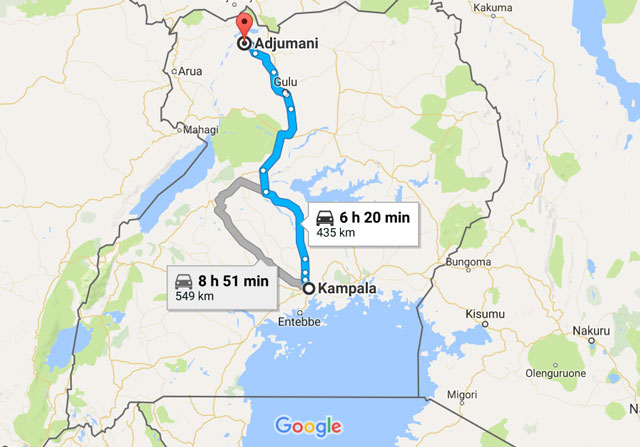
He says he gets his charcoal from as far as Adjumani district in northwestern Uganda and sells a bag at Shs 80,000. He says this is the first time they have seen charcoal prices shoot that high.
Ephraim Zinda, 34, who has been in the charcoal transport business since 2008 told The Independent that charcoal prices could be rising because local governments in the source districts in northern Uganda are getting tougher on charcoal burners. This has led to reduced supplies. But he says corruption contributes to the high cost of transport and the eventual user price.
Zinda says along the 350km route, even before he ignites the engine of his truck headed for Kampala from Gulu, he pays anywhere between Shs700, 000 to Shs1.5 million for a General Receipt to the National Forestry Authority. Then along the way, he must leave between Shs30, 000 and Shs20, 000 at every road block in Gulu town, Bobi, Kiryandongo, Luweero, Kawempe, Bwaise, and Kasubi. Zinda says this is the reason most trucks tend to move at night to minimize these unnecessary costs.
“Otherwise we might end up with nothing by the time we reach our destinations,” he says.
Charcoal remains the most preferred energy source for use in about 90% of households in Kampala while elsewhere the average is 65% with the rest using wood fuel. Overall, about 4,961 metric tonnes of charcoal is used by households in Uganda per day while institutions use a total of 887.3 metric tonnes of charcoal over the same period.
A 2015 energy ministry survey on the status of charcoal production, transportation, trade, and consumption noted that up to 2.144 million metric tonnes or 35,153,081 bags of charcoal each weighing 60kgs are produced and consumed every year in Uganda. This charcoal is valued at about US$38 million.
Wrong interventions?
Charcoal preference in Kampala is mostly a practical decision as most households do not have separate cooking areas to set up a wood fire and charcoal is more portable, smoke free, and burns hotter and longer. But with rising prices, many users and experts are looking for ways out.
Experts argue that in the longer term, economic benefits of charcoal must be replaced with new development options. They say the government needs to quickly find sustainable and safe energy options for rural and poor populations.
Currently, Uganda’s entire charcoal value chain is characterised by informal and inefficient systems and has received little interest from investors. It is characterised by inadequate enforcement of regulations, poor organisation of players, use of inefficient technologies, and lack of standards and unsustainable production practices.
Interventions that are spoken about often focus more on reducing the negative environmental impact of charcoal production and use and less on addressing the need for sustainable energy supplies for a growing urban population.
Urging the government to sensitize the population about the dangers of wood-based fuels to the environment, quickly enforcing measures against illegal wood harvesting, banning illegal charcoal production, and imposing heavy fines and taxes on charcoal and firewood trade, will salvage the environment but people have to cook.
James Kakeeto, the Chief Executive Officer of Creation Energy Limited, a Kampala-based renewable energy initiative told The Independent on Sept.22 in an email that Ugandans are still struggling to switch to cleaner fuels because even with all its disadvantages, charcoal remains the most adopted cooking fuel in Uganda and, this is largely determined by the fact that it is still considered cheap compared to other options such as LPG and electricity.
To most Ugandans, LPG is considered unsafe and risky in terms of causing possible fires in households. The fact that Ugandans have used charcoal for a long time means that the attachment is high, to the extent that the people find any other new option such as briquettes an inefficient inconvenience.
Kakeeto told The Independent that weaning Ugandans off wood-based fuels cannot be done in an instant, but rather gradually.
For a start, the government needs to mobilise financial resources to make the Biomass Energy Strategy, which seeks to promote investments in efficient biomass technologies such as briquettes and energy efficient cook stoves work. That would help cushion entrepreneurs from the investment risk associated with alternative and modern cooking fuels.
 The Independent Uganda: You get the Truth we Pay the Price
The Independent Uganda: You get the Truth we Pay the Price



Dear Independent,
We need to completely think and promote alternative energy cooking solutions. Dont even put UMEME on the menu. Than one is already costly for the common person. This is an opportunity for those promoting solutions like energy saving cooking stoves and other solutions like bio gas and solar. Its possible the solutions are in place but there is lack of awareness and rigidity to new solutions.
Excellent idea, we need to go for alternative fuels because the situation is becoming alarming.
use wastes to get briquettes, bio gas for those with feed stock etc. Because either way, we have to EAT..
Excellent write-up. I absolutely appreciate this site.
Keep it up!